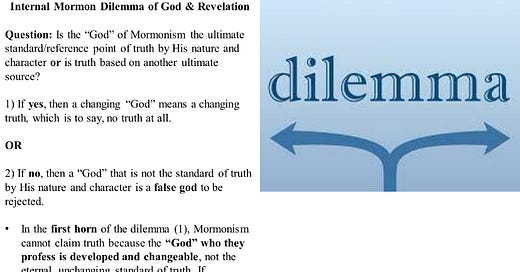The Mormon Dilemma of God
Is the “God” of Mormonism the ultimate standard and reference point of truth by His nature and character or is truth based on another ultimate source?
John 17:3—“This is eternal life, that they may You, the only true God, and Jesus Christ whom You have sent.”
“Here, then, is eternal life—to know the only wise and true God; and you have got to learn how to be Gods yourselves,...” (Joseph Smith, The Teachings of the Prophet Joseph Smith, pp. 346-347)
The Mormon Dilemma of God
A dilemma—though used more frequently in the popular sense to describe undesirable alternatives in a difficult life situation—in logic or philosophy means when a position requires either one of two unsatisfactory, invalid alternatives that, if unsolved, both demonstrate the position to be false.
It is important to be careful in declaring a dilemma because there is also the logical risk of engaging in fallacies—bifurcation fallacy, either/or fallacy, the law of the excluded middle. The truth is, often there are not just two options—it may be one, the other, both, or neither in certain cases. That being said, logic sometimes requires that there be one answer or another and that both cannot be true.
A legitimate philosophical or logical dilemma only exists when the presuppositions or premises of a position necessarily require options that are logically self-defeating.
In speaking about “God,” we cannot avoid dealing with issues of metaphysics—the theory of reality. In approaching the nature and character of God, it is unavoidable to discuss the nature of truth and reality. While revelation is discussed in more depth elsewhere, it is pertinent here because the nature of revelation is based upon the nature of the God who reveals Himself. Joseph Smith declared in 1833,
Doctrine & Covenants 93:29-30—“Man was also in the beginning with God. Intelligence, or the light of truth, was not created or made [uncreated], neither indeed can be.
30All truth is independent in that sphere in which God has placed it, to act for itself, as all intelligence also otherwise there is no existence.”
This is an interesting statement from Joseph Smith on the nature of truth. It declares several certain presuppositions about God, man, truth, revelation, and how these concepts are all related. These assertions state that man, in a different form, was in the beginning with God (cp. John 1:2). This means the fundamental aspects of what makes man man have existed as long as God has existed and it implies (stated more clearly elsewhere in Mormon theology) that the difference between man and God is not one of kind, but one of degree. Intelligence, called “the light of truth,” is an independent, uncreated entity distinguished from God and man. Truth is said to be independent of God and man, but can be manipulated by God in that He can place it somewhere. Further, independent truth can act for itself. Truth and intelligence are personified here, and truth can even act for itself. These presuppositions provide key implications or consequences for the relationship of God, man, and truth in Mormonism.
Is the “God” of Mormonism the ultimate standard and reference point of truth by His nature and character or is truth based on another ultimate source?
1) If yes, then a changing “God” means a changing truth, which is to say, no truth at all.
2) If no, “God” who is not the standard of truth by His nature and character is a false god to be rejected.
In the first horn of the dilemma (1), Mormonism cannot claim truth because the “God” who they profess is developed and changeable, not the eternal, unchanging standard of truth. If Mormonism cannot offer the ultimate standard and reference point of truth in their “God,” then Mormonism is false.
In the second horn of the dilemma (2), Mormonism has admitted to proclaiming a false god, independent of truth (D&C 93:29-30), over whom there is greater ultimate authority.




